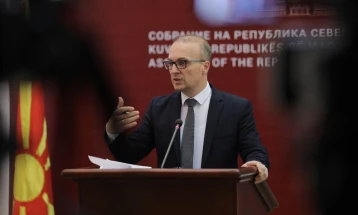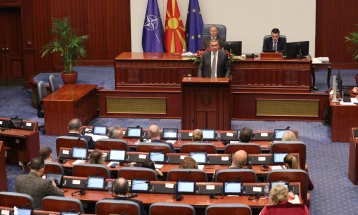Angelovska-Bezhoska: Inflation will further fall, but structural reforms needed for greater resilience to shocks
- Inflation is expected to fall by the end of the year with further stabilization of food and energy prices on the world stock markets, in the absence of major external and domestic shocks. In the medium term, the inflation rate would fall to the historical average of around 2 percent. In the coming period, attention should be paid to structural policies that would increase domestic production and reduce the sensitivity of the domestic economy to some future potential shocks, said National Bank Governor Anita Angelovska-Bezhoska.

Skopje, 16 December 2023 (MIA) - Inflation is expected to fall by the end of the year with further stabilization of food and energy prices on the world stock markets, in the absence of major external and domestic shocks. In the medium term, the inflation rate would fall to the historical average of around 2 percent. In the coming period, attention should be paid to structural policies that would increase domestic production and reduce the sensitivity of the domestic economy to some future potential shocks, said National Bank Governor Anita Angelovska-Bezhoska.
Commenting on the latest data on inflation in an interview with Slobodna TV, Angelovska-Bezhoska said that since the fourth quarter of the past year, when the highest rate of around 20% was reached in October, a constant decrease in the inflation rate has been observed, the Governor's office said in a press release.
"Latest statistical data from October and November, with rates of 3.5% and 3.1% respectively, show the downward trend. According to our latest October projections, the average annual inflation rate for 2023 will be around 9.5%. For the next year, of course assuming that there will be no major external and domestic shocks, we expect this trend to continue, whereby, in the medium term, the historical average for our economy of around 2% would be reached," Angelovska-Bezhoska pointed out, adding that the National Bank's expectations are very similar to those of the European Central Bank in terms of the inflation movements in the Eurozone and the EU, which expects to achieve the inflation target of 2 percent during 2025.
Angelovska-Bezhoska, adds the press release, pointed out that the setting of the monetary policy has contributed to the reduction of inflation. Like the rest of the central banks since the beginning of the crisis, the National Bank also started tightening the monetary policy at the end of 2021 through operations on the foreign exchange market.
"We started with a moderate tightening, as the central banking community mostly did, and then went on to stronger tightening of monetary policy with interest rates. Given the structure of our economy and our financial system, we did not limit ourselves to acting only through interest rates, but also actively influenced through the liquidity channel, and we also used the other monetary and macroprudential instruments, which we have at our disposal," said the Governor.
Inflation depends on many variables, therefore it is crucial to conduct prudent macroeconomic policies in order to maintain positive trends and stabilize inflation and inflation expectations on a longer-term basis, Angelovska-Bezhoska said.
In addition, she noted that it is very important to contribute through structural policies towards increasing the supply and match it with the demand, thus reduce the vulnerability of the domestic economy, which is extremely susceptible to shocks being a highly open economy with trade openness of 140% of GDP.
"In addition to being dependent on energy imports, our economy has low energy efficiency, i.e. we consume three times more energy than in the EU for the production of one unit of GDP. Additional factors affecting inflation include the degree of effective competition, i.e. price pressure is lower in economies where there is more effective competition, as well as the conditions of the labor market. If action is taken towards all of them, through structural policies, the resilience of the economy would increase," Angelovska-Bezhoska said.
Photo: National Bank







